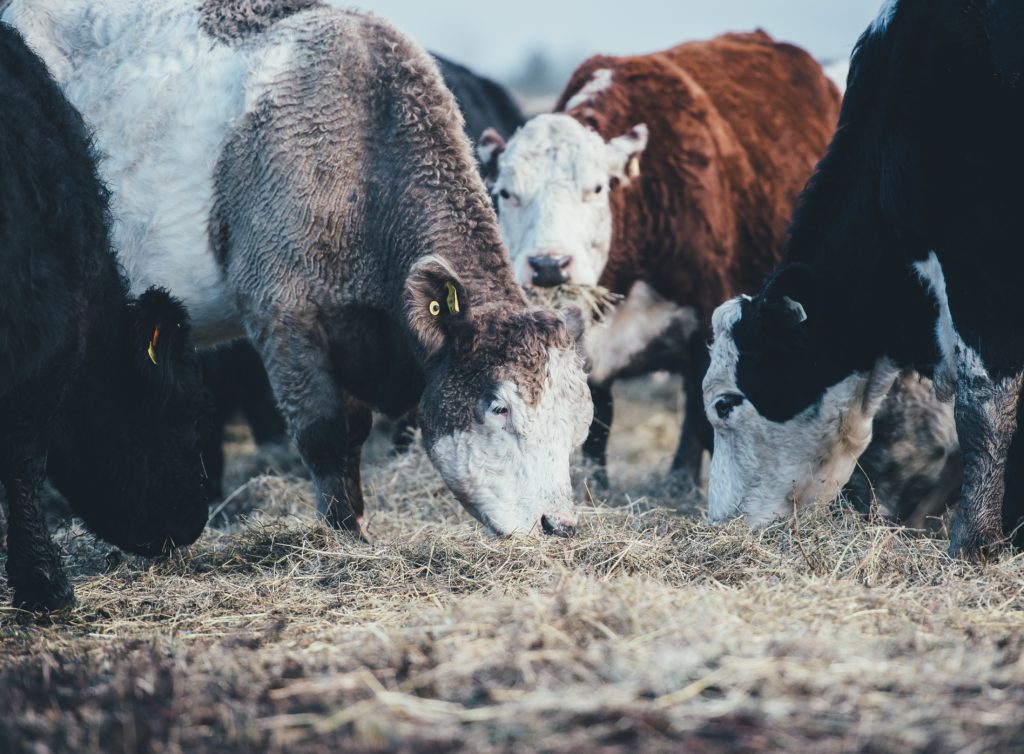


When organic farmers talk about organic food, they’re not just talking about food that humans eat. Organic animals in Canada are required by the Canadian Organic Standards to eat 100% organic feed.
It’s extremely important that farm animals get the nutrition they need to grow strong, prevent illness and disease, and provide healthy food for Canadian families. In fact, organic feed for animals is closely regulated by the government, just like organic food for humans.
One of the most important ways to keep animals healthy and strong is by providing the right type of nutrition. Livestock feed is a complicated concoction, though. There’s a science behind the ideal feed for each type of animal. For example, section 6.4.3 h of the Canadian Organic Guidelines has this to say about ruminants:
“Long fibres are important for a healthy digestion. They stimulate rumen muscle contractions, which leads to more chewing (of the cud) and saliva production. The mixture of cud with saliva helps buffer the rumen allowing the beneficial microorganisms to thrive. Feeding only short-fibre silage can lead to poor digestion or rumen acidosis. Although 15% is higher than commonly seen in conventional dairy production, it is considered to be a very good way to prevent acidosis and related health problems.”
Like humans, it’s important that animals have a balanced diet that includes essentials like fats, protein, fibre, and vitamins. Overexposure or underexposure to certain nutrients and minerals can immediately impact an animal’s health, which is why organic farmers keep a close eye on what their animals eat.
Although many organic animals are able to graze and forage in outdoor organic pastures, the weather in Alberta doesn’t allow for that year-round. Farmers have to supplement grazing with mixed feed, and replace most grazing with supplied feed in the winter months.
Organic feed is non-GMO and does not have synthetic additives to promote growth. Some synthetic supplements are allowed when there aren’t natural supplements available, but only for the purpose of keeping the animal healthy, not to make it grow faster or larger.
There are plenty of ways farmers can gauge how well a feed mix is working for their animals. They can monitor overall health, the production rates of animal by-products (like milk or eggs), and illness and disease rates. They can even take a look through excrement to see what’s going on inside the bellies of their animals.
However, many farmers (organic and conventional alike) choose to consult with other experts to find the right blend of organic food for their livestock. Veterinarians, nutritionists, and the organic certifying agency can all help determine which type of food and supplements are needed for specific animals. In some cases, factors like breed, production stage, weather, animal health and potential diseases, living conditions, and geography can play a role in determining optimal nutrition.
Although organic feed for different types of livestock is available for purchase from retailers and feed mills, many farmers choose to mix their own feed for their animals.
Farmers with organic crops and livestock benefit from a constant supply of livestock feed. Farmers can use field crops for animal feed, and in turn, organic animals produce organic manure that can be applied to field crops. This also helps farmers feed their livestock more affordably, as store-bought organic feed can cost as much as double the amount conventional feed costs.
Aside from the high price tag, one of the main challenges of organic livestock feed is undersupply and shortages. Luckily, the regulations allow for some flexibility in the case of unfortunate and unpreventable circumstances, including natural disasters. After all, keeping animals healthy and well-fed is always the main priority for farmers and regulating bodies, no matter what’s going on.
In the case of an unforeseen event that leads to feed shortages, farmers can provide animals with non-organic food for up to 10 consecutive days. When there are regional shortages, non-organic forage can be used.
Poor or inadequate nutrition can lead to devastating losses for farmers and their herds. One example is newborn calves that contract a case of the “scours.” Dehydration, sickness, and weakness set in, and if it’s not treated quickly, calves may die.
One of the best preventative measures for the scours is ensuring calves receive colostrum from their mothers immediately after birth. When that doesn’t happen naturally, farmers should milk the colostrum and feed it to the calf, or source colostrum from somewhere else (it can be frozen).
That saying, “you are what you eat” certainly applies to certified organic farm animals. Although organic animals eat organic feed, all farmers in Alberta are motivated to keep their animals healthy and growing strong with quality nutrition. Head to the organic production systems: general systems and management standards to learn more about how organic livestock is raised in Canada.
Do you want to learn more about what organically-grown means in Alberta? Would you value monthly updates on Alberta’s local organic sector – including legislation, farming practices, GMO regulation, and more? Now you can receive it the way you want to:



![]() More Get the Facts
More Get the Facts
Apr 9 | Get the Facts
This article was written prior to the tragic passing of Cathy Halonen, and is being published in remembrance of her. Her passion and dedication to o
Read MoreMar 30 | Get the Facts
Walking through grocery stores, you’ve seen food with marketing phrases like “all-natural," “sustainably grown," “pasture raised," “hormon
Read MoreJan 14 | Get the Facts
There’s no doubt about it: antibiotics are life-saving medications that play an important role in the lives of humans and animals alike. They’
Read More